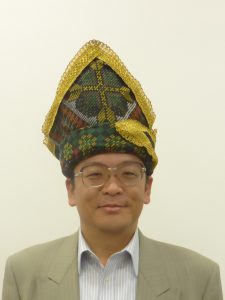Staff Page / Staff directory
YAMAMOTO, Hiroyuki

- Research Departments・Position
- Cross-regional Studies
Associate Professor - Area
- Area studies, Media studies
- Research Interests / Keywords
- ・Malaysian studies
・Nationalism, ethnicity and print media
・Disaster risk management and information
・Theatre, film and political culture
・Postwar internment and repatriation - Contact
- yama@cseas.kyoto-u.ac.jp
YAMAMOTO, Hiroyuki
Overview
Malaysian studies
Malaysia has created a harmonious and prosperous society in which people from diverse backgrounds have maintained and developed their own cultural and religious characteristics. This study examines how ethnicity and peranakan (hybridity) have historically been shaped and developed in Malaysia, focusing on the case of the state of Sabah.
Nationalism, ethnicity and print media
This project collects periodicals in local languages, many of which are not systematically collected and held, although they are valuable material for understanding history from a different perspective from the success stories of mainstream groups. Through this, the project will shed light on an aspect of contemporary Southeast Asia's history in which cross-border human and ideological exchanges remained close even after independence as a nation-state. A database of articles from the Jawi monthly magazine “Qalam”, with all articles translated into Romanised characters, is now available online, and a catalogue of all articles from the Chinese-language literary magazine “Chao Foon” has been compiled and published.
Disaster risk management and information
Research on disaster response and recovery processes in the humanities and social sciences. Based on case studies from Indonesia and Malaysia, this study will focus on the collection and practical application of information on disaster damage and recovery/rehabilitation. This study aims to learn from the experiences of institutionally and technologically resilient societies and socially and psychologically resilient societies by comparing disaster response in Japan and Southeast Asian countries, and to combine them to create societies that are multidimensionally resilient to natural disasters and other calamities.
Theatre, film and political culture
To critically examine the theory that print media played an important role in the process of developing national consciousness among people from different cultural backgrounds, this study addresses the role of stage performance and film, to identify the creation, transmission, reception and transformation of a common national narrative, focusing on the hybridity and cross-border nature of their production and performance. This study will show how the often competing values of loyalty and justice/fairness were woven into theatre and film in the Straits Settlements, and how these two values have been deployed in theatre and film in Malaysia to the present day.
Postwar internment and repatriation
Japan did not switch from wartime to post-war all at once after 15 August 1945, but tens of thousands of Japanese were interned in former war zones, doing labour work and waiting to be repatriated. In contrast to the well-known internment in Siberia, little is known about the internment of Japanese in South East Asia after World War II. This study collects haiku, tanka and poetry collections written by Japanese internees in Singapore and Malaya, as well as accounts compiled after their return to Japan, to shed light on the reality of internment in Southeast Asia. While many Japanese accounts of war experiences are written solely from the perspective of the Japanese, this study highlights an aspect of the history of relations between Japan and Southeast Asia throughout the war and post-war period by looking at the impact of the presence of Japanese internees on the post-war political processes in Singapore and Malaya.